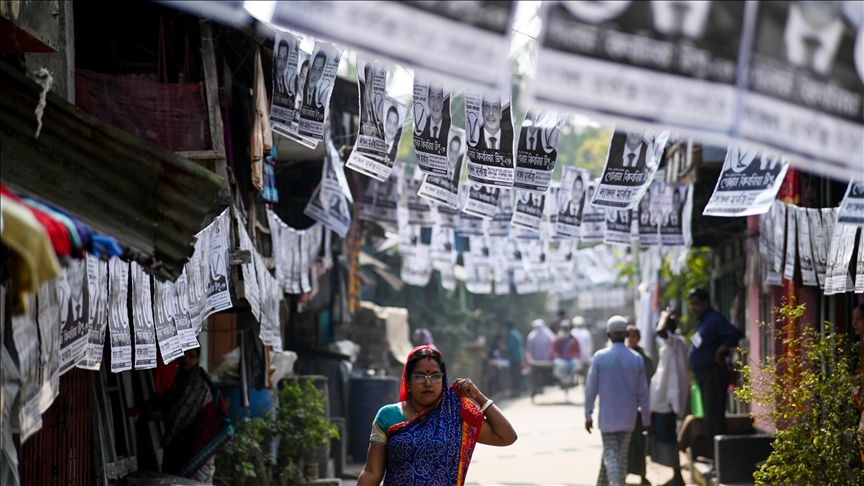‘Brutal response’ to Bangladesh protests was ‘strategy’ by ex-Premier Hasina to hold onto power: UN
Up to 1,400 people killed between July and August of last year, with 12% of them children, and over 22,000 injured, says UN human rights office's 114-page report

- There are reasonable grounds to believe that hundreds of extrajudicial killings, extensive arbitrary arrests, detentions, and torture were carried out as part of strategy to suppress protests, says UN human rights chief Volker Turk
- UN rights office recommends reforms in judiciary, police, urges against any political baN
ISTANBUL
The UN human rights chief on Wednesday said the “brutal response” to mass student demonstrations last year in Bangladesh was a “calculated and well-coordinated strategy” by the government of former Prime Minister Sheikh Hasina to “hold onto power.”
“There are reasonable grounds to believe hundreds of extrajudicial killings, extensive arbitrary arrests and detentions, and torture were carried out with the knowledge, coordination, and direction of the political leadership and senior security officials as part of a strategy to suppress the protests,” Volker Turk said in a statement as his office released a report on events that marked the end of the Awami League’s 15-year rule.
Bangladesh saw widespread protests against Hasina, who fled to India on August 5, prompting the formation of a transitional government led by Nobel laureate Muhammad Yunus on Aug. 8.
The UN human rights office's 114-page report estimates that up to 1,400 people were killed between July and August of last year, with 12% of them children, and more than 22,000 injured during the uprising against Hasina's government.
It recommended judicial and police reforms and urged authorities to drop charges against journalists, lawyers, trade unionists, civil society activists, and other human rights defenders.
The report also emphasized the need for a “fair, impartial, and comprehensive investigative process” and called for ensuring judicial independence and protecting the rights of journalists, Awami League supporters, minority leaders, and others engaged in civic or political dissent.
Refrain from political bans
The UN human rights office urged against the ban on any political party as the South Asian nation prepares for general elections, the first since Hasina’s fall.
While the transitional government has suggested that elections could be delayed until next year, political parties continue to press Yunus’ administration to hold them as soon as possible.
“Refrain from political party bans that would undermine a return to a genuine multiparty democracy and effectively disenfranchise a large part of the Bangladeshi electorate,” the UN human rights office said.
However, the UN human rights chief Turk noted that the “brutal response was a calculated and well-coordinated strategy by the former government to hold onto power in the face of mass opposition.”
Turk said the testimonies and evidence “we gathered paint a disturbing picture of rampant state violence and targeted killings that are amongst the most serious violations of human rights and which may also constitute international crimes. Accountability and justice are essential for national healing and for the future of Bangladesh.”
Hasina remains in India despite a formal extradition request from Dhaka.
Rory Mungoven, who leads the Asia-Pacific region at Turk’s office, said the issue of extradition is “really a bilateral process.”
“We hope that states will cooperate and support each other towards this goal of accountability, whether that’s India or other states where people may take refuge,” Mungoven told a news conference in Geneva.
Hasina faces cases of genocide and crimes against humanity in Dhaka. Her virtual address to Awami League supporters last weekend triggered violent protests in the Bangladeshi capital.
Last weekend, a security crackdown was launched in Bangladesh after the ousted leader appeared in a Facebook broadcast from neighboring India, triggering violent protests.
Jahangir Alam Chowdhury, head of the interim government’s Interior Ministry, dubbed the operation "Devil Hunt," telling reporters it would continue "until we uproot the devils."
Security forces arrested 1,308 people nationwide between Saturday night and noon Sunday, most of them reportedly linked to Hasina’s Awami League party.
Dhaka-based human rights group Odhikar on Wednesday reported that at least a dozen people had died in detention since last year’s student uprising, with causes including torture and gunshot wounds.
Anadolu Agency website contains only a portion of the news stories offered to subscribers in the AA News Broadcasting System (HAS), and in summarized form. Please contact us for subscription options.






